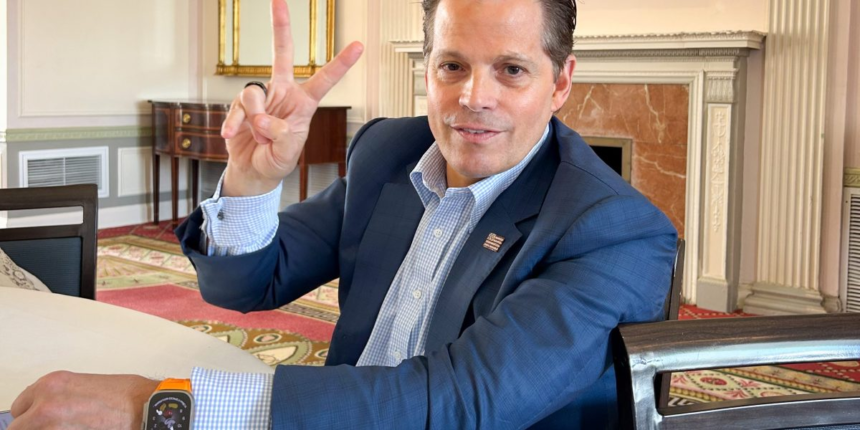Anthony Scaramucci strides into the seaside ballroom of Bermuda’s plush Hamilton Princess hotel sporting a well-tailored suit, a spangled American flag pin, a Mickey Mouse watch, and plenty of hair gel.
Scaramucci is here to talk up his hedge fund’s latest SALT investors conference. But prior to our interview, he tells me, he was yukking it up with Bermuda’s premier, E. David Burt. Scaramucci, proud of his youthful appearance at age 61, says he shared a favorite one-liner extolling darker complexions: “Black don’t crack,” he recalls telling Burt—“but beige don’t age!”
This is “the Mooch”— a nickname Scaramucci picked up in childhood—on full blast, entertaining and outrageous. His body pulses with energy and he talks in a rapid stream, his nasal Long Island accent peppered with F-bombs.
Most Americans encountered the Mooch for the first time in 2017. That’s when Scaramucci got a gig as first-term President Donald Trump’s communications director, only to yap his way out of that job after 11 days. His fleeting tenure became fodder for late-night comics and social media wags, who coined the metric of “a Scaramucci” to measure the length of a failed short-term stint.
It’s hard to come back from an episode like that. Yet Scaramucci has somehow done just that, and eight years later, he has evolved into something new—arguably, one of the most influential voices in American politics and finance.
In the last few years, Scaramucci has parlayed his disastrous White House foray into a role as one of Trump’s most arch critics, often drawing on his personal knowledge of the man he worked for during the 2016 presidential campaign. Using his massive social media following and his cohosting of the popular The Rest is Politics: US podcast, Scaramucci has won over a legion of unlikely fans across the political landscape. At the same time, his popular crypto-focused SALT conferences have attracted leading celebrities and business figures and, along with his hedge fund, helped Scaramucci amass a personal fortune of nearly $200 million.
The Mooch’s brassy schtick is still there, but now he has something serious to say. Wielding insights gleaned from world history and his voracious reading, he offers Americans a compelling road map to transcend the crassness and culture wars of the moment.
Scaramucci’s childhood was about as far removed as you can get from the Hamilton Princess. The son of a crane operator on Long Island, his family did not go to five-star hotels—or really anyplace—except, he recalls, one precious vacation to Miami Beach when he was 12. That was the time he and his brother persuaded their father to take them to Disney World.
“I’ve got to give my old man credit for this, because he really didn’t want to do this,” he tells me. “I mean, this poor son of a bitch—chainsmoker, Scotch drinker, blue-collar worker—all he wanted to do was lay on the beach, but I got his ass in a bus, and we went from Miami Beach up to Orlando.”
The four-hour bus ride allowed for barely half a day at the theme park, but that was enough to leave Scaramucci with indelible memories, an abiding love of the Magic Kingdom, and a swelling desire to get rich and have all the things his family could not then afford. Five decades later, his eyes are a pool of wonder and pain as he recalls the trip.
Though he doesn’t say so, that glimpse of the Happiest Place on Earth likely was a salve for Scaramucci, who has said that he experienced poverty and domestic violence as a child. He’s a quiet benefactor of former Yankee manager Joe Torre’s Safe at Home Foundation, a charity that provides services to children who have experienced trauma.
Following law school, Scaramucci twice failed the New York bar exam, but he got his spoils all the same. After a seven-year stint at Goldman Sachs, he realized he could make even more money by starting his own hedge fund, Oscar Capital, which he would go on to sell to another financial giant in 2001. Four years later, he started his current fund, SkyBridge Capital.
Today, a source close to Scaramucci said his net worth is at the higher end of the $150 million to $200 million range (the exact value has fluctuated significantly, since most of his portfolio is in the volatile crypto sector). That fortune was amassed primarily from personal investments and fees he collects from his fund, SkyBridge Capital, which oversaw $2.6 billion in assets at the end of 2024. He is also an author, earning royalties from The Little Book of Hedge Funds and several other books.
Not everyone is impressed by Scaramucci’s business acumen. Upon learning I was writing this profile, a general partner at a crypto venture capital fund fumed that Scaramucci was “dumb as a bag of rocks” when it came to finance, and that his success came entirely from his skills as a networker.
John Darsie, the CEO of the SALT franchise, dismisses such criticisms. He says that while Scaramucci has never held the role of chief investment officer at SkyBridge, he has always been instrumental in supplying the broad strokes of the firm’s investment strategy. Darsie also credits Scaramucci with making a series of critical pivots when the firm was on the rocks.
Those include dropping Skybridge’s original focus on hedge-fund seeding to embrace instead a fund-of-funds model, which Scaramucci pulled off by acquiring a unit of Citi bank in 2010. Then there’s SkyBridge’s 2020 pivot to crypto, which now makes up 70% of the fund’s portfolio alongside its investments in big hedge funds such as Millennium Management Global Investment and Elliott Management, and bets on credit and private equity.
“If you could say one thing about the last 100 years, central bankers have been drunk drivers,” he says. “Bitcoin takes the keys away from the central bankers.”
The 1609 Bar is a short beachward walk from the Hamilton Princess lobby. Its ample windows offer sumptuous views of Bermuda’s picturesque harbor. On this April evening, the SALT conference guests are sipping Rum Swizzles—the national drink—and Dark & Stormys while chattering loudly about crypto projects.
This is the 25th such gathering for SALT, which stands for SkyBridge Alternatives, and began in 2008 as a forum to discuss non-mainstream investments. This year’s event in Bermuda has drawn some of the industry’s leading figures, but it’s no 2022.
That’s the year Scaramucci’s firm cohosted the most famous—and infamous—gathering in crypto history. It took place in the Bahamas, another island nation with aspirations of supplementing its tourism economy by becoming a digital assets hub. The A-listers in attendance included Tom Brady, Bill Clinton, Katy Perry, and Shark Tank‘s Kevin O’Leary.
The main draw, though, was the other cohost—a schlubby crypto tycoon named Sam Bankman-Fried, who was heading to the apex of his fame. Known to everyone as SBF, Bankman-Fried ran the crypto exchange FTX, then valued at $25 billion, which co-sponsored the conference and was spending lavishly on political donations, acquisitions and endorsement deals. Shortly after the Bahamas gathering, SBF also bought a 30% stake in Scaramucci’s fund, SkyBridge, as part of a broader $67 million investment.
Meanwhile, the broader crypto world has moved on. In Bermuda, SBF’s crimes do not come up as the SALT guests toast to the price of Bitcoin crossing $100,000, and enthuse about stablecoins and AI-infused blockchains.
Hovering over a buffet spread, he snatches an hors d’oeuvre and catches my eye. “They call me the Mooch for a reason,” he says with a grin. It’s a line he has no doubt used hundreds of times, but it still lands.
Scaramucci can slip into the full-wattage version of the Mooch in an instant, parceling out jokey lines and chummy confidences at will. These qualities have led some to observe that Scaramucci’s true talent is as a connector: someone who can read the room, and draw together some of the world’s most powerful and influential people.
It’s no wonder that in 2016, a former reality-show host and fellow New Yorker who was still trying to learn the ropes as a professional politician found a high-profile role for Scaramucci in his presidential campaign.
The Mooch now sees his time working for Trump as a low point in his life. “My wife and I almost got our asses divorced,” he says. “She hates Trump almost as much as Melania does.”
The Scaramuccis’ near divorce came in 2017, a year when the Mooch became a star in Trumpworld, and a polarizing figure in Washington, D.C. Deidre, Scaramucci’s second wife and the mother of two of his five children, was ready to leave after he missed the birth of his youngest son to attend a Boy Scouts event with Donald Trump. “But also,” Scaramucci reflects, “we were fighting about other things.”
Things are steady now. After getting over his brief intoxication with political power, Deidre says, her husband has grounded himself by embracing the bookworm and homebody sides of his personality. Even at home, though, he relishes being the Mooch, Deidre says when I reach her on the phone shortly before Independence Day: Her husband has been parading around the house in his “It’s not the Fourth of July until my wiener comes out” T-shirt.
In Bermuda, Scaramucci proudly shows a tattoo on his ring finger that he got after the near-divorce: “That’s Deidre—the letter D in her handwriting, on my wedding finger.” Deidre got his initial on her finger too. Instead of ending his marriage, Scaramucci had a rather spectacular breakup with his employer, who fired him after the Mooch criticized two other top lieutenants in the first Trump administration, Reince Priebus and Steve Bannon, in a profanity-laced interview with the New Yorker.
In the years since his dramatic exit from public service, some of Scaramucci’s jibes at Trump have come in the form of cheap laughs, including one about how the orange of his Mickey Mouse wristband is more fetching than Trump’s complexion.
But he also takes every opportunity he can to issue what he sees as a serious warning: Scaramucci—who still identifies as a Republican—claims the president is running the same playbook as the leaders of fascist Germany. And like others who spent time in the inner circle of Trump’s White House, he has since become a vocal critic of a man he calls malevolent and amoral.
Unsurprisingly, Trump no longer thinks highly of Scaramucci, either. Following his second election victory, the President took to Truth Social to blast his former staffer as “a major loser who was fired from the administration after only 11 days.” Reached for comment on this story, White House spokesman Kush Desai told Fortune: “No one cares about what Scaramucci thinks or says.”
He says many of his banker and hedge-fund friends quietly agree with him, and he wishes they would do the same. “My buddies on Wall Street, who know better,” he says, “they don’t have the balls to speak out.”
Scaramucci tugs on my sleeve to emphasize his latest point. After 40 minutes, his energy hasn’t flagged a whit. To borrow from Walt Whitman, the Mooch is out of the cradle, endlessly rocking.
Yet this colorful Mooch persona—which he describes as an “Italian exoskeleton”—hides an inner Scaramucci who is deeply contemplative. Unlike those who treat reading as a pretext to name-drop a title they have half-skimmed, Scaramucci’s literary range is authentic and impressive.
Onstage, on his podcast, and in our conversation, Scaramucci effortlessly weaves in references—along with plenty of profanity—to the historian Barbara Tuchman; Thomas Hobbes’ Leviathan; and The Art of Chemistry, a popular 2023 novel about a California woman who perseveres in science in the face of blatant sexism.
Scaramucci’s love of the novel reflects another aspect of his personality: a perhaps unexpectedly feminist side. Katty Kay, a prominent former news broadcaster who cohosts The Rest is Politics: US, says that Scaramucci stands out from other men. “One of the things that my female friends particularly say they like about the podcast is the respect he shows me,” she tells me. It may seem a low bar, but Kay says this has been a refreshing change from other male coworkers, and a stark contrast with political forums where, she says, research shows men typically speak 30% more than women.
Scaramucci’s own politics, meanwhile, are hard to pin down. He describes himself as libertarian-leaning and faithful to the GOP, but was tapped as a surrogate for the Harris-Walz presidential campaign. He is vociferously anti-Trump but also impatient with the knee-jerk identity politics of some on the left. Most of all, though, Scaramucci is fixated upon an earlier era of American greatness—and aspects of it not captured by the MAGA movement.
He cites former Secretary of State Dean Acheson’s memoir Present at the Creation, about the U.S. creating a peaceful world from the ashes of World War II by helping its onetime enemies to rebuild. Juxtaposing it with the petty, retribution-driven political climate of today, he is struck by that American generation’s commitment to raising living standards worldwide, and reducing global conflict.
“They didn’t punish the vanquished,” he says. “They supported the vanquished. They built a world order. They integrated the system.”
Now, though, Scaramucci says the memory of the horrors, collective trauma, and brave sacrifices of the WWII era has faded from public memory, opening the door for would-be oligarchs to impose a new political order. Citing the U.K. historian Laurence Rees’s new book The Nazi Mind, he runs down the warning signs as he sees them in Trump’s actions: his spreading of conspiracy theories; the use of “us and them” rhetoric; leading as a hero; eliminating resistance; and so on.
And despite his own connections in Silicon Valley, Scaramucci worries that the so-called tech-broligarchy, and their MAGA allies, are failing to carve out a place in society for ordinary Americans. He is particularly incensed by the current vogue among tech leaders for Curtis Yarvin, the once-fringe far-right blogger who proposes replacing U.S. democracy with a CEO-led monarchy.
Their prescription, Scaramucci warns, threatens to replace the American dream with a society where a small elite lives behind barbed wire in mansions, and ordinary people struggle for a decent living. This country, he says, needs a leader who has imbibed the lessons of history.
“If you had the right transformational leadership in the country, you could go to the American people and say, ‘Listen, here is your heritage, and here’s what your future could be,’” he says. “’Or you could have a dystopian future, which is what JD Vance wants you to have.’”
All of this raises the question of whether Scaramucci has ambitions for political office himself. He certainly has the name recognition, with his 1 million X followers and large podcast audience. Scaramucci is also collaborating with the celebrity business professor and podcaster Scott Galloway to develop a mentorship program called Lost Boys to help boost young men—a demographic that is flailing badly, and one that the Democratic Party desperately needs to win back.
Could the Mooch complete his jester-to-statesman evolution by running as a charismatic centrist who can bring the U.S. into a post-partisan age?
“Where would I run?” he asks when I put the question to him. “I can’t run as a Republican—that’s JD Vance’s party. Okay, so I’m gonna run in AOC’s party?” he scoffs, adding that his wife would castrate him if he tried to return to politics.
In any case, Scaramucci has a fund and crypto empire to run and a family to focus on, including his second son’s directorial debut at the Tribeca Film Festival, with a film titled, fittingly, Money Talk$. (Its main character is a $100 bill.) Kay, his podcast host, points out that he is also incapable of spending any length of time away from Long Island, where his mother, whom he sees often, and extended family all live close by.
“Some people have said, ‘If Trump is elected, I’m going to leave,’ or ‘If he starts coming after me, I’m going to leave,’” she says. “Anthony? He’s not going anywhere.”
As our interview wraps up, word is out that the Vatican has just chosen its first American pope, and Scaramucci rushes off to offer his two cents on a podcast, before it’s time to get onstage for his conference’s keynote address.
Being a politician or statesman may have its appeal one day, but for now, Scaramucci is having plenty of fun just being the Mooch.









